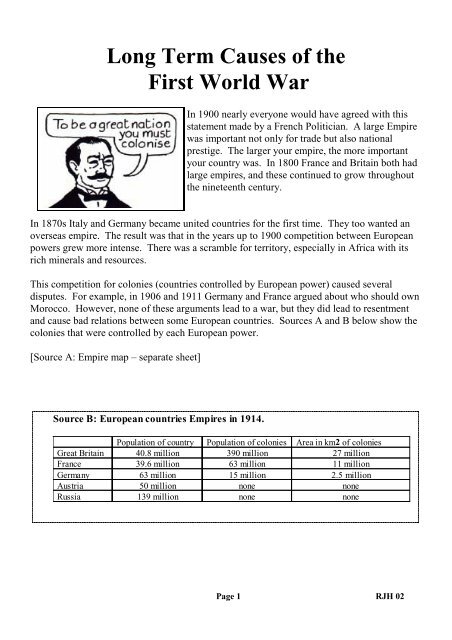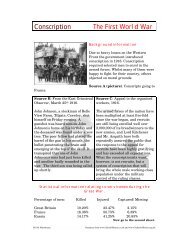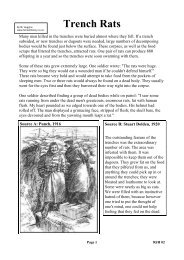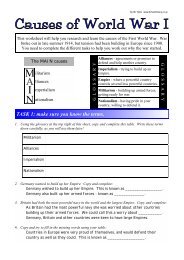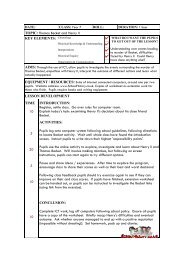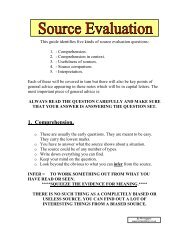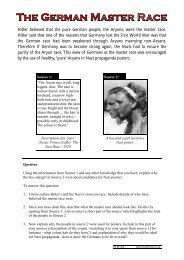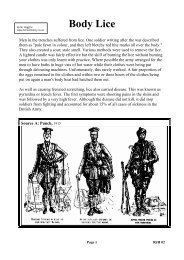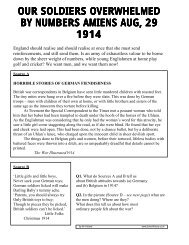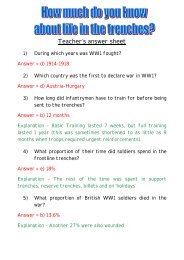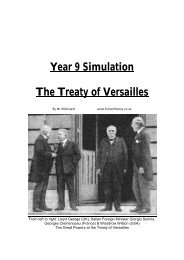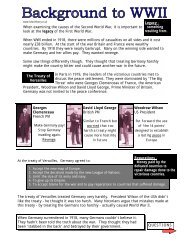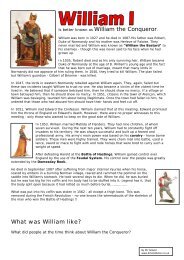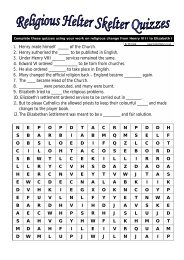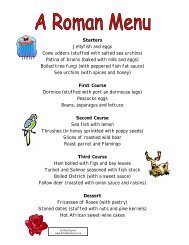Long Term Causes of the First World War - School History
Long Term Causes of the First World War - School History
Long Term Causes of the First World War - School History
Create successful ePaper yourself
Turn your PDF publications into a flip-book with our unique Google optimized e-Paper software.
<strong>Long</strong> <strong>Term</strong> <strong>Causes</strong> <strong>of</strong> <strong>the</strong><br />
<strong>First</strong> <strong>World</strong> <strong>War</strong><br />
In 1900 nearly everyone would have agreed with this<br />
statement made by a French Politician. A large Empire<br />
was important not only for trade but also national<br />
prestige. The larger your empire, <strong>the</strong> more important<br />
your country was. In 1800 France and Britain both had<br />
large empires, and <strong>the</strong>se continued to grow throughout<br />
<strong>the</strong> nineteenth century.<br />
In 1870s Italy and Germany became united countries for <strong>the</strong> first time. They too wanted an<br />
overseas empire. The result was that in <strong>the</strong> years up to 1900 competition between European<br />
powers grew more intense. There was a scramble for territory, especially in Africa with its<br />
rich minerals and resources.<br />
This competition for colonies (countries controlled by European power) caused several<br />
disputes. For example, in 1906 and 1911 Germany and France argued about who should own<br />
Morocco. However, none <strong>of</strong> <strong>the</strong>se arguments lead to a war, but <strong>the</strong>y did lead to resentment<br />
and cause bad relations between some European countries. Sources A and B below show <strong>the</strong><br />
colonies that were controlled by each European power.<br />
[Source A: Empire map – separate sheet]<br />
Source B: European countries Empires in 1914.<br />
Great Britain<br />
France<br />
Germany<br />
Austria<br />
Russia<br />
Population <strong>of</strong> country<br />
40.8 million<br />
39.6 million<br />
63 million<br />
50 million<br />
139 million<br />
Population <strong>of</strong> colonies<br />
390 million<br />
63 million<br />
15 million<br />
none<br />
none<br />
Area in km2 <strong>of</strong> colonies<br />
27 million<br />
11 million<br />
2.5 million<br />
none<br />
none<br />
Page 1 RJH 02
<strong>Long</strong> <strong>Term</strong> <strong>Causes</strong> <strong>of</strong> <strong>the</strong><br />
<strong>First</strong> <strong>World</strong> <strong>War</strong><br />
Activity 1: National Rivalry<br />
1. Look at Sources A and B. Which two countries had expanded <strong>the</strong>ir empires <strong>the</strong> most by<br />
1870?<br />
2. Describe in your own words what <strong>the</strong> word ‘colony’ meant in 1900?<br />
3. Describe in your own words what <strong>the</strong> word ‘empire’ meant in 1900?<br />
4. Which European country had <strong>the</strong> largest Empire?<br />
5. Which two new countries were born in <strong>the</strong> 1870s?<br />
6. Look at Source B. How large were <strong>the</strong> Empires <strong>of</strong> <strong>the</strong>se two new countries?<br />
7. Which two countries argued about who should have Morocco in 1906 and 1911?<br />
8. Germany wanted to become a ‘great nation’ in 1900. What would Germany have to do in<br />
order to increase <strong>the</strong> size <strong>of</strong> its Empire?<br />
9. Why would this frighten Britain and France?<br />
10. Using an Atlas and Source B, names <strong>the</strong> British colonies marked as 1 to 11 on <strong>the</strong> <strong>World</strong><br />
Map in 1914.<br />
Page 2 RJH 02
The Arms Race<br />
<strong>Long</strong> <strong>Term</strong> <strong>Causes</strong> <strong>of</strong> <strong>the</strong><br />
<strong>First</strong> <strong>World</strong> <strong>War</strong><br />
When <strong>the</strong> German Emperor Wilhelm II,<br />
known as <strong>the</strong> Kaiser in Britain, made <strong>the</strong><br />
statement in Source C, everyone knew<br />
what he meant to do next and began to<br />
increase <strong>the</strong> size <strong>of</strong> <strong>the</strong>ir armed forces.<br />
This lead to an arms race in which each<br />
country tried to build a much bigger and<br />
better military machine than <strong>the</strong>ir enemy.<br />
Between 1870 and 1914, military spending<br />
by <strong>the</strong> main European powers increased by<br />
300 percent! After 1871 all <strong>the</strong> major<br />
nations except Britain brought in<br />
conscription, which meant that all men<br />
over <strong>the</strong> age <strong>of</strong> 18 were forced to serve a<br />
minimum period in one <strong>of</strong> <strong>the</strong>ir country’s<br />
armed services.<br />
Source C: This is what <strong>the</strong> Emperor <strong>of</strong><br />
Germany, Wilhelm II, said in 1898.<br />
Source D: European Military spending and <strong>the</strong> size <strong>of</strong> <strong>the</strong>ir armies, 1913 - 14.<br />
Country<br />
Soldiers<br />
Money spent in millions.<br />
Britain<br />
750,000<br />
50,000,000<br />
France<br />
1,500,000<br />
40,000,000<br />
Germany<br />
8,250,000<br />
60,000,000<br />
Austria<br />
750,000<br />
22,500,000<br />
Russia<br />
1,250,000<br />
15,500,000<br />
Italy<br />
750,000<br />
10,000,000<br />
Britain had one <strong>of</strong> <strong>the</strong> best-trained and equipped armies in Europe, even though it wasn’t very<br />
big. Which o<strong>the</strong>r armed service do think Britain spent <strong>the</strong> vast majority <strong>of</strong> its money on?<br />
In 1900 <strong>the</strong> only way to travel around <strong>the</strong> <strong>World</strong> was by ship. Whichever country ‘ruled <strong>the</strong><br />
waves’ could rule <strong>the</strong> world. Great Britain had <strong>the</strong> largest navy in 1900. It had to be to<br />
protect <strong>the</strong> British Empire. However, Britain was beginning to realise that it did not have<br />
Page 3 RJH 02
<strong>Long</strong> <strong>Term</strong> <strong>Causes</strong> <strong>of</strong> <strong>the</strong><br />
<strong>First</strong> <strong>World</strong> <strong>War</strong><br />
enough resources to protect its vast Empire. In particular, Britain was worried about <strong>the</strong><br />
growing size <strong>of</strong> <strong>the</strong> Germany Navy.<br />
The British Government was determined that <strong>the</strong>ir navy should remain <strong>the</strong> biggest. Soon an<br />
arms race to build new battleships began between Britain and Germany. In 1906, Britain<br />
launched HMS Dreadnought, a new battleship that was stronger and faster than any o<strong>the</strong>r ship<br />
built before. Soon Germany also began to build ‘Dreadnoughts’ as well. The table below in<br />
Source E shows <strong>the</strong> results <strong>of</strong> this naval arms race.<br />
Source E: German and British ships in 1914.<br />
Type <strong>of</strong> ship<br />
Dreadnoughts<br />
Pre-Dreadnoughts<br />
Battle-cruisers<br />
Cruisers<br />
Destroyers<br />
Torpedo boats<br />
Submarines<br />
Great Britain<br />
29<br />
40<br />
34<br />
74<br />
167<br />
49<br />
75<br />
Germany<br />
17<br />
20<br />
9<br />
41<br />
130<br />
0<br />
21<br />
Source F: Dreadnought, 1906<br />
Page 4 RJH 02
<strong>Long</strong> <strong>Term</strong> <strong>Causes</strong> <strong>of</strong> <strong>the</strong><br />
<strong>First</strong> <strong>World</strong> <strong>War</strong><br />
Activity 2: The Arms Race<br />
1. What was <strong>the</strong> name <strong>of</strong> <strong>the</strong> German Emperor?<br />
2. What name did <strong>the</strong> English-speaking people <strong>of</strong> <strong>the</strong> <strong>World</strong> call him?<br />
3. Read Source C. What do think <strong>the</strong> Kaiser was hinting at when he made this statement?<br />
4. Read Source D. What happened to <strong>the</strong> amount spent by each country on its armed<br />
services?<br />
5. Which country had <strong>the</strong> largest army?<br />
6. Which country spent <strong>the</strong> most money on its armed services?<br />
7. What is meant by <strong>the</strong> term ‘conscription’?<br />
7. How did people travel across <strong>the</strong> <strong>World</strong> in 1900?<br />
8. Why was it important that Britain had <strong>the</strong> largest navy in 1900?<br />
9. Which country got into an arms race with Britain to build <strong>the</strong> largest navy?<br />
10. Which new battleship was developed by Great Britain in 1906?<br />
11. Which country won <strong>the</strong> arms race to build <strong>the</strong> largest navy in Source E?<br />
12. Using Sources C to F, explain what is meant by <strong>the</strong> term ‘arms race’ and why <strong>the</strong> main<br />
European powers began to increase <strong>the</strong> size <strong>of</strong> <strong>the</strong>ir armed services from 1900 to 1914?<br />
Alliance System<br />
Between 1900 and 1914 <strong>the</strong> great powers <strong>of</strong> Europe became suspicious <strong>of</strong> each o<strong>the</strong>r and<br />
began to increase <strong>the</strong> size <strong>of</strong> <strong>the</strong>ir armed services. Eventually this turned into an arms race.<br />
Both France and Britain were afraid <strong>of</strong> <strong>the</strong> Kaiser’s ambition to build a larger German<br />
Empire. The only way that Germany could achieve this in 1914 was by attacking and taking<br />
o<strong>the</strong>r European countries colonies. Eventually, each <strong>of</strong> <strong>the</strong> great powers realised that if <strong>the</strong>re<br />
was going to be a war <strong>the</strong>y would need friends and allies to help <strong>the</strong>m defeat <strong>the</strong>ir enemies.<br />
Page 5 RJH 02
<strong>Long</strong> <strong>Term</strong> <strong>Causes</strong> <strong>of</strong> <strong>the</strong><br />
<strong>First</strong> <strong>World</strong> <strong>War</strong><br />
They formed two gangs. These gangs were called alliances. The Map below shows <strong>the</strong><br />
gangs or alliances that each <strong>of</strong> <strong>the</strong> great European powers had joined by 1914.<br />
Triple Entente:<br />
Britain<br />
France<br />
Russia<br />
Triple Alliance:<br />
Germany<br />
Austro-Hungary<br />
Italy<br />
Activity 3: Alliance System.<br />
On your own map <strong>of</strong> Europe colour in <strong>the</strong> countries Britain, France, Russia, Germany,<br />
Austria and Italy to show which gang or alliance <strong>the</strong>y belonged to. You will need two<br />
different colours. Remember to draw a key at <strong>the</strong> bottom <strong>of</strong> <strong>the</strong> map.<br />
Page 6 RJH 02


